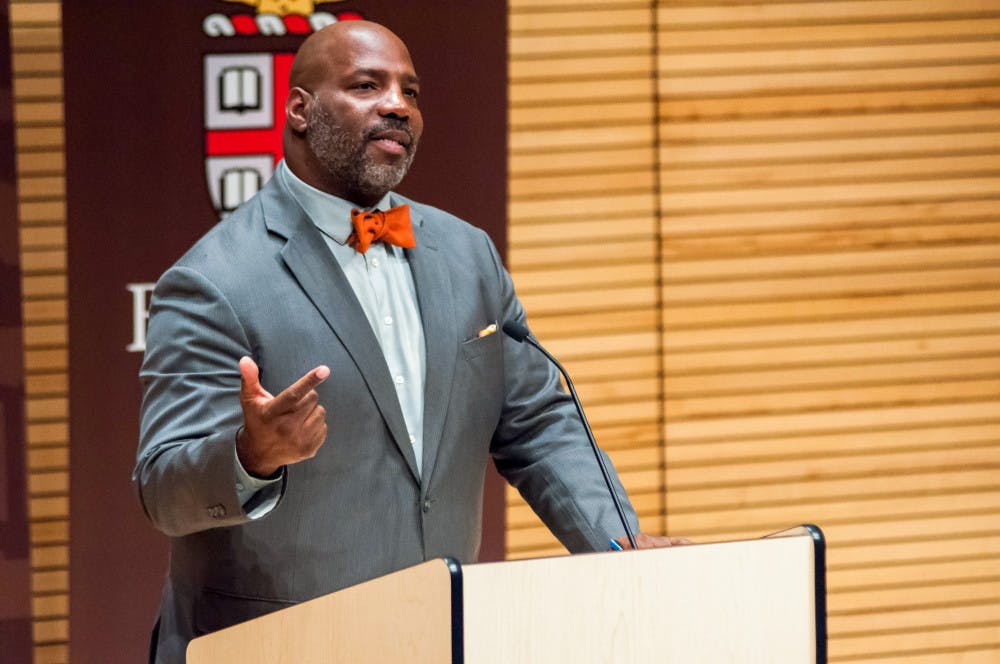Updated on Oct. 12 at 12:56 p.m.
During Tuesday’s lecture titled “A Note From the Margin: The Unsafe Spaces of Democracy,” Jelani Cobb, professor of journalism at the Columbia University School of Journalism and staff writer for the New Yorker, shared a quote from his father, who was a boxer: “The punch you’re most vulnerable to is the one you’ll be hit with most often.” The lecture is the first event in the Reaffirming Values series.
“If there are in fact individuals who do not wish to see you perform well in these institutions, it’s of little benefit to tell them exactly where your biggest vulnerabilities are,” Cobb said.
“I don’t believe in safe spaces,” he added. In the discourse of safe spaces, people “want to be coddled, they want to be kind of treated with the utmost of delicacy.”
Cobb acknowledged this may not be fair, but “generations of people prior,” including his own, have confronted these same issues, he added.
“My generation, we never would have protested (safe spaces),” Cobb said. “Few of us felt that the institutions belonged to us in the first place,” he said, adding, “We anticipated hostility, and we did not feel we were full shareholders in the institutions.”
As an example of not needing safe spaces, Cobb shared the story of Hank Aaron, a black American Major League Baseball player, who broke Babe Ruth’s home run record in 1974 “under the most adverse circumstances available,” he said. Aaron received death threats, and black cats were thrown out onto the field in acts of hostility.
“When he hit his 715th home run in 1974, he did it in the unsafest of spaces,” Cobb said.
Yet Cobb qualified his argument heavily. He criticized a letter sent from a University of Chicago dean to the school's incoming class in which the dean argued that safe spaces have no place at the university, calling its tone “Marine Corp." Cobb compared the letter to a restaurant that greeted its patrons by saying: “We’re not going to give you your food quickly; it’ll probably be cold; the waiter is going to be an asshole. But hey, we’re telling you up front so come anyway. Welcome."
Additionally, he said that when touting the right to free speech and open inquiry, people have to be aware of the ways in which the United States has “fallen short of democracy,” Cobb said. Several aspects of the Constitution are clearly racialized, such as the three-fifths compromise and the fugitive slave clause, he added.
“The document itself begins with a particular kind of racial hue,” Cobb said. “There are other elements on the face of it that seem to be abstract or universal but in the relativistic context of race actually take on other connotations.”
To highlight these elements, Cobb shared some examples of constitutional interpretations that have caused harm to marginalized groups. The Fifth Amendment’s guarantee of due process of law has been used to uphold the institution of slavery, the Second Amendment to uphold gun ownership, which causes disproportionate harm to people of color, and the First Amendment to justify and rationalize discrimination against gays and lesbians through religious freedom laws in Indiana, he said.
“Does this mean that we should get rid of these freedoms and curtail them? No, it doesn’t. But it means that we should understand, as a kind of democratic maturity, that we don’t all have the same relationship to the Constitution,” Cobb said. “These relationships are relative.”
The next event in the Reaffirming Values series is a “One Day Personal Workshop on Personal Narrative and Community Values” by Marshall Ganz, senior lecturer in public policy at Harvard’s Kennedy School of Government.





